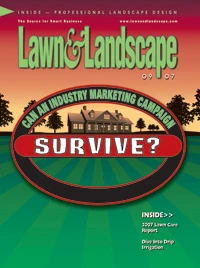Pesticide expenditures in the chemical lawn care market, according to Lawn & Landscape research, continue to increase.
In 2006, 59 percent of lawn care operators report they spent $10,000 or less annually on pesticide products while about 41 percent spent more than $10,000, according research conducted by Lawn & Landscape via InsightExpress. This remains unchanged from the previous year.
So are LCOs spending more or less on lawn care products? Nearly 72 percent of LCOs, slightly more than the previous year, reported their pesticide expenditures increased in 2006. That spending increase, on average, was about 27 percent, the study says.
The trend toward high expenditures, according to industry insiders, will increase for the foreseeable future as the costs for goods, labor and transportation increase. Not surprising, product cost (63 percent) remains the top factor influencing LCO purchasing decisions, followed by dealer/salesperson recommendations and efficacy. Only among Western contractors did “safety” rank among the top three factors when making a purchasing decision, the data says.
So does cost influence the choice between a generic or a name-brand product?
More than 53 percent of LCOs who cited cost as an influence on their purchasing decisions have used generic pesticides, the data says. Likewise, of that 53 percent, more than half believe generic pesticides work just as well as brand-name pesticides, the study indicates.
Generic products are leveling the playing field for LCOs by allowing smaller companies to compete against the larger national firms, says Bob Yarborough, business unit manager, turf and ornamentals, at Advan in Roswell, Ga.“As more products become generically available you’re going to see more LCOs using them because they can reduce costs and make them more competitive,” he says.
However, name-brand pesticides still play an important role with LCOs. Rarely does an LCO solely use generic products in his chemical lawn care operation, the research says. And more than half of LCOs who ranked cost as the top influencing factor indicate brand-name pesticides offer superior service and support compared to generic products.
While generic suppliers provide LCOs with technical support, Yarborough conceeds it’s not on the same magnitude as the support supplied by brand-name manufacturers.
“A name-brand company may have 50 sales reps across the U.S. while a generic maybe has four or five,” he says. “Does that mean an LCO can’t get his question answered? No.” Yarborough adds distributors also play an important role in disseminating information and answering LCOs’ technical questions.
LCO’s such as Greg Scharf, owner of Greg’s Lawn Service in Cedar Rapids, Iowa, are comfortable using a combination of name-brand and generic chemical lawn care products. While cost plays a factor, the common denominator is quality and efficacy.
“Price is really important,” Scharf says. “But the product also has to be a quality product. I don’t want to have to send a technician back to do a lawn twice because the product didn’t do what it was supposed to do.”
It’s easy to understand why the industry trend is for LCOs to gravitate towards the lowest-priced product, says Mark Urbanowski, senior marketing specialist for U.S. turf and ornamental business at Dow AgroSciences, Indianapolis. However, Urbanowski urges LCOs to weigh the pros and cons of forsaking name-brand pesticides to save a few dollars with a generic product. You don’t have to look very far to see examples of this, he says.
“LCOs often look at generics as a great deal because they can pocket that cost savings,” Urbanowski says. “But last year was a horrible crabgrass year and the basic products were on the ball while the generics missed it.”
As a premium is placed on improving lawn care client retention, Sean Casey, vice president sales at Nufarm Turf & Ornamental in Greenwood, Ind., believes LCOs will trend toward products designed to provide better results and more satisfied customers. Choosing the most effective products, and maybe not the least expensive, can result in an overall decrease in an LCO’s cost of doing business, he says.
“Reducing customer cancellations or costly re-treatments will have a significant impact on the LCO’s bottom line,” Casey says.
Wayne Shiveley, president of Pine Ridge Landscaping in Chantilly, Va., says, in his mind, the jury is still out on whether the cost savings outweigh the quality issues inherent with integrating generic pesticides into a quality lawn care program.
“We’re really not done testing and researching whether generics will work for us,” Shiveley says. “The programs we’re using now are the same programs that have worked well for us for a number of years and are proven to be effective. And with over a 90 percent renewal rate, I’d say they’re working pretty well for us.”

Explore the September 2007 Issue
Check out more from this issue and find your next story to read.
Latest from Lawn & Landscape
- ExperiGreen, Turf Masters Brands merge
- EquipmentShare cuts ribbon on new Maryland branch
- Strathmore acquires Royal Tree Service in Montreal
- In a new direction
- The December issue is now live
- Ignite Attachments debuts 80-inch, severe-duty bucket
- EquipmentShare breaks ground on Roswell branch
- NaturaLawn of America adds Schwartz, Medd to operations team





